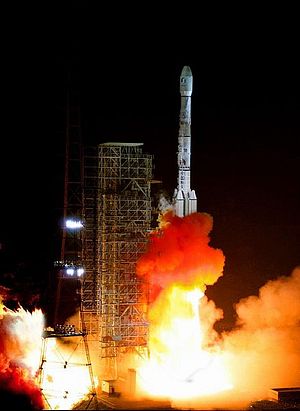Time for the weekly round-up of China news!
In a fascinating piece yesterday, Xinhua traced the origins of China’s space program, an exercise inspired by the 45th anniversary of China’s first satellite launch. The Dongfanghong-1 was launched on April 24, 1970, the culmination of years of research – and far from the end of China’s fervent quest to prove itself worthy of membership in the “space club.”
The Xinhua piece emphasizes the hardships and obstacles facing China’s early aeronautics engineers. Wang Xiji recounted how, in an early attempt to design a sounding rocket, “researchers had to calculate their computations by hand or by abacus… The computing papers were stacked higher than their desks.” In addition to the difficulty of performing scientific tasks in primitive conditions, scientists also had to scramble to meet political requirements, such as figuring out how to have the satellite broadcast “The East Is Red” (or “Dongfang Hong,” a song praising Mao Zedong, and the source of the satellite’s name) and how to artificially inflate its size to make it visible from Earth. The scientists even had to get special permission from Premier Zhou Enlai to remove Mao badges from the satellite equipment when they discovered that the extra weight posed a problem.
Xinhua contrasts those early days to China’s success today – “China is now developing Dongfanghong-5 with cutting edge technologies,” the article concludes. The article emphasizes the two contrary yet complementary sources of Chinese pride — the determination to achieve a goal despite poverty and self-described backwardness and a more straight-forward pride in how China now enjoys the opposite conditions — wealth and advanced science and technology. Wang Xiji himself, now 97, proudly proclaims, “China’s carrier rocket technology is the world’s best… China’s independent innovation should never be underestimated.”
In other news, China’s PLA Navy is also celebrating an anniversary this week — founded on April 23, 1949, the PLAN turns 66 this year. To celebrate, China Military Online released an overview of the PLAN’s functions, organization, and purpose.
Writing for the Brookings Institution, Richard C. Bush takes a look at the nitty-gritty (but oh-so-important) details of the Hong Kong government’s recently released plan for electoral reform. If you want to understand what the proposal actually says – and what that will mean in practice – this is a must-read. Bush also highlights the key questions for Hong Kong’s public and legislators to consider as they decide whether or not to support the reform package.
Over at Foreign Policy, Ilan Goldenberg and Ely Ratner describe China’s efforts to befriend both Saudi Arabia and Iran – and argue that such tight-rope walking is the very reason why China will never be a leader in the Middle East. The Diplomat’s own Mu Chunshan recently provided an example of this balancing policy in action as China tried to formulate a diplomatic response to the Saudi-led military campaign against Iranian-backed rebels in Yemen.

































